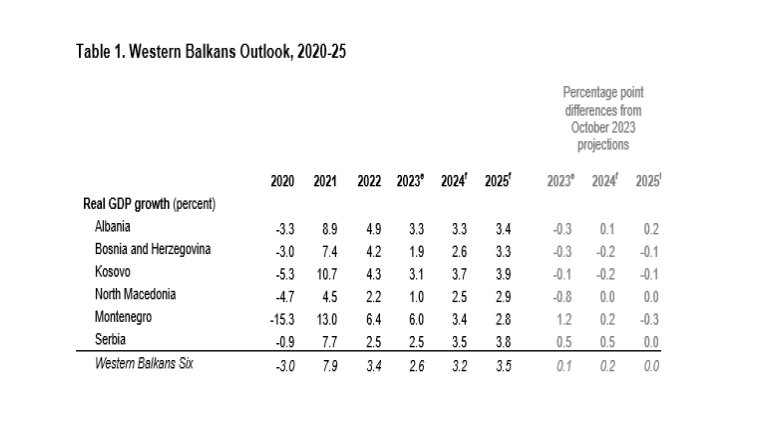VIENNA, April 11, 2024 - Economic growth in the Western Balkans is projected to rise in 2024, with further acceleration expected in 2025, bringing it back to pre-pandemic averages. To narrow the development gap with the European Union and improve living standards for its people, the region needs to continue implementing reforms. This includes increasing investments to make cities greener, allowing them to contribute more efficiently to overall economic development, says the World Bank's new Western Balkans Regular Economic Report, released today.
Economic activity in the Western Balkans is expected to increase to 3.2 percent this year, 0.2 percentage points higher than anticipated by the World Bank in the previous edition of the report, and further to 3.5 percent in 2025. The individual forecasts for six economies of the Western Balkans: Albania, Bosnia and Herzegovina, Kosovo, Montenegro, North Macedonia, and Serbia, were included in the World Bank's Economic Update for Europe and Central Asia, also released today.
The slight increase in growth projections in the medium term reflects cautious optimism that the Western Balkans have weathered a number of shocks over recent years. Risks to the outlook remain tilted to the downside, however. Persistent weakness in global growth, especially in the Eurozone, would translate into weaker investment and trade with the region. In addition, there are domestic factors that put the projections at risk including flare-ups in geopolitical tensions, outward migration, electoral uncertainty, and persistent inflation.
"After years of turbulence caused by the COVID-19 pandemic and energy crisis, it is encouraging to witness the Western Balkans' growth returning to pre-pandemic levels and poverty continuing on a declining trend," said Xiaoqing Yu, World Bank Country Director for the Western Balkans. "However, the current progress is still insufficient to meet the aspirations of citizens and improve living standards towards those of the European Union. The Union's new Growth Plan for the Western Balkans presents an opportunity to stimulate economic development through reforms and investments, particularly in the green economy".
A six-billion-euro Plan will help the region strengthen economic ties with the European Union, its largest trading partner, and implement reforms to enhance economic integration within the Western Balkans. According to the World Bank, making improvements such as reducing border clearance times and modernizing payment systems in the region can lead to significant economic benefits for the countries involved.
Investing in the green transition and enhancing the livability of cities in the Western Balkans could also help reinvigorate regional growth, according to the World Bank report.
"Cities are where economic development really happens. They bring workers closer to jobs, fueling productivity, increasing opportunities, and facilitating the exchange of goods and ideas," said Natasha Rovo, Senior Economist at the World Bank, and a lead author of the report. "Cities in the Western Balkans have demonstrated resilience in recent years. However, they have struggled to become engines of economic growth, owing not only to the effects of structural and demographic challenges but also vulnerability to a changing climate. Investments in greening could be an opportunity to kickstart growth in the future."
The report recommends actions on three main fronts to green and strengthen cities in the Western Balkans.
First, making cities more compact would be good for growth, make public service delivery cheaper, and improve environmental outcomes. Second, reforms and investments to expand public transport systems and shift to greener, more energy-efficient buildings would limit air pollution that leads to premature deaths of thousands of people in the region every year. Third, extreme heat in cities, with temperatures up to 4.5-7.5°C hotter in summer compared with rural surroundings, will negatively affect productivity and human health. City governments should adopt measures to cool physical spaces through better urban design and planning, and targeted investments.







